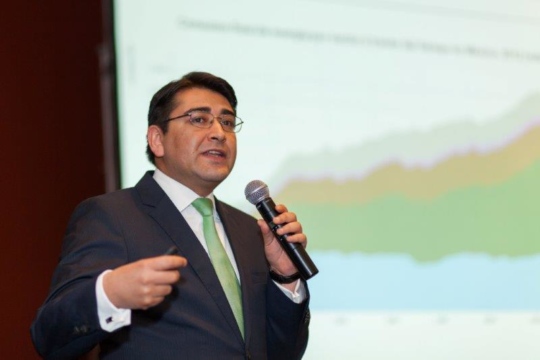
Energy & Mining in Colombia
Colombia has to remain competitive with other major producers such as Mexico to attract needed investment in extractive industries.
This post is also available in: Español
As part of his energy and climate campaign promises, Colombian President-elect Gustavo Petro’s intention to halt oil exploration and pilot fracking projects and accelerate the transition to renewable energy raises questions about the direction of energy policy in the country. To address some of these concerns, the Inter-American Dialogue hosted the online event “Colombian Energy Policy under Petro,” on July 27, 2022. Nate Graham, manager of the Energy, Climate Change and Extractive Industries Program, gave opening remarks. Dr. Daniela Stevens, program director and moderator of the event, then proceeded to introduce the panel of experts and inquired about the specifics of Petro’s fossil fuels and renewable energy policies.
On the one hand, Ani De la Quintana, associate director and risk analysis leader for the Andean region at Control Risks, argued that it is essential to distinguish between idealistic campaign rhetoric and realistic policy implementation. Despite sweeping claims during his campaign, moderation has already crept into Petro’s discourse. Karla Schiaffino Pérez, senior analyst for the Americas at Verisk Maplecroft, echoed this statement, mentioning the new government’s recent caveat that the energy transition will gradually take place over the next two decades. According to Schiaffino, this moderate stance demonstrates the recognition of the pivotal role of extractive industries in Colombia’s export profile. Therefore, it is possible that Petro may settle for the “low hanging fruits” of banning fracking and not issuing new oil exploration contracts (rather than pursuing the prohibition of coal mining or oil exploitation) as a way of fulfilling his campaign promises without seriously affecting the country’s macroeconomic stability.
On the other hand, John Padilla, CEO of IPD Latin America, pointed out that currently, we know very little about future implementation of Petro’s promises. After an announcement by the appointed Minister of the Environment, Susana Muhamad, one action we can reasonably expect is the banning of fracking, even against the backdrop of a favorable ruling by the Council of State. However, uncertainties abound; for example: the future of Ecopetrol’s corporate governance, Colombia’s oil and gas self-sufficiency, and the respect for existing energy contracts, among other pressing issues. Given the context of high levels of debt, mounting inflation, and persistently high unemployment, such circumstances trigger market jitters and threaten the activity of the extractive industries, which account for more than 50 percent of exports and around 15 percent of the country’s fiscal revenues.
Highlighting these uncertainties, José Zapata, partner at the law firm Holland & Knight, stated that the incoming government is performing a confusing “juggling act” between radicalism and moderation that affects the entire energy sector. Among the multiple contradictions within Petro’s discourse, one is his promise to respect existing contracts, but also to stop fracking, which must dismiss existing contracts. Another example is the elimination of tax exemptions, which could jeopardize the incentives driving investment in the renewable energy sector in technologies such as offshore wind energy. Lastly, amidst the drive towards the energy transition, the incoming government has paradoxically discussed increasing coal exports to take advantage of high international prices due to the global energy crisis.
The discussion focused afterward on the feasibility of implementing Petro’s main energy and climate policy objectives. Panelists agreed that his perhaps overly ambitious proposals will face a number of obstacles in implementation. De la Quintana stressed that, although Petro has managed to build a strong coalition in Congress, its effectiveness is yet to be measured and its internal contradictions could eventually become an obstacle to government initiatives. She specifically pointed out that his current political strength and favorability are not guaranteed in the future and institutional checks and balances (such as the High Courts, the Attorney General, etc.) along with social unrest could eventually push for a reconsideration of some of his radical pledges. To that end, Padilla added that a short “honeymoon period,” as in the case of President Gabriel Boric in Chile, could impede the approval of Petro’s more ambitious proposals. Aspects such as a strong relationship with the United States, as well as the stability of the cabinet, should hence be key signals to the market to ensure the financing of Colombia’s energy transition in the long run.
Conversely, Zapata noted that the various public powers and entities are building an unprecedented political alignment, opening a policy window that enables huge risks and opportunities. This unusual consensus could usher in numerous regulation and ruling changes within the first year, perhaps overwhelming implementation capacities. In addition to the legal, political, and economic challenges, Schiaffino mentioned that there are technical challenges to consider in order to meet Petro’s energy and climate policy goals. For example, the improvement of transmission and energy storage infrastructure is essential to boost renewable energies and accomplish Petro’s climate action program at large.
Finally, the panel concluded with reflections on the prospects of the energy sector in Colombia, according to each guest's expertise. De la Quintana stressed that in the short term, Colombia should capitalize on the accelerated economic growth partly driven by high oil prices. Looking forward, cautious fiscal policy management is necessary to avoid negative economic impacts resulting from the slowdown in the global economy and a likely reduction in energy commodity prices over the next 18 months. Similarly, Schiaffino emphasized the need to maintain oil and gas production levels without closing the door to the exploitation of unconventional and offshore fields to ensure Colombia's energy self-sufficiency (which is not guaranteed for more than 10 years, according to the volume of proven reserves).
In a different light, Padilla underscored that maintaining market stability is essential to avoid a strong devaluation of the national currency that could affect long-term renewable energy contracts, which are negotiated in Colombian pesos. Zapata lastly called for preserving legal stability in the rule of law and abandoning the “paper myth” (the belief that issuing laws automatically solves problems) to carefully design new regulations without cluttering the legal system. Experts agreed that maintaining, bolstering, and improving the regulatory foundations of Colombia’s energy transition must involve recognizing how closely intertwined the fate of traditional extractive industries and that of renewable energies are.
Colombia has to remain competitive with other major producers such as Mexico to attract needed investment in extractive industries.
Given their close proximity to the United States, LAC countries are well-positioned to capitalize on the surplus of US gas exports and current buyer’s market.
The electrification of the transportation sector is crucial to reducing carbon emissions and tackling global climate change.


